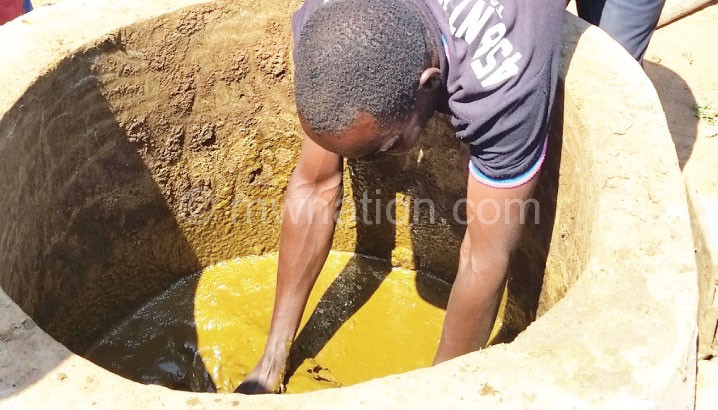Saving environment with cow dung
In Chikwawa and Nsanje, herds of cattle are all over the place.
In these Shire Valley districts, the animals symbolise prestige and riches.
However, the mooing animals are often associated with four Ms—money, meat, milk and manure.
“We want the herd to grow as big as possible. We only sell the animals when we have a problem,” says Chimoto villager Elina Josamu, whose household owns 68 head of cattle in Chimoto Village, Traditional Authority (T/A) Katunga, Chikwawa.
However, it is clear that the villagers do not fully use the dung scattered across the parched terrains where the animals graze.
Zuwawu Frank, who owns 378 head of cattle in Chikhawo Village, T/A Tengani, Nsanje, refuses to sweep it away like dirt.

The farmer supplements his household’s income by selling bags of manure derived from dung.
“We used to get it for free, but he started selling when people realised that dung forms rich manure. But those with smaller herds leave it to rot in the rubbish pits,” says Mike Frank, one of his customers in Chikhawo Village.
Like Chimoto, Frank’s village is home to a biogas plant which highlights the communities’ potential to turn dung into an environment-friendly alternative for charcoal and firewood.
Since last year, Malawi Environmental Endowment Trust (Meet) has been empowering community-based childcare centres (CBCCs) in the two rural settings to use dung to produce biogas for cooking. The dung used for cooking porridge for children is collected from the community the locals say.
The two biogas plants are part of a K10 million trial under Shire River Basin Management Programme, says Meet coordinator Karen Price.
“Dung is being underutilised here. We wanted to observe if we can put it to better use,” she explains.
Child protection officer Fabiano Potani envisions the introduction of biogas reducing overreliance on firewood as almost 350 CBCCs in Chikwawa are piling massive pressure on forests.
Nearly all CBCCs in the country use firewood for cooking porridge for the children, worsening deforestation.
Presently, the Department of Forestry estimates that the country loses almost three trees in every 100 annually.
Principal Secretary in the Ministry of Natural Resources, Energy and Mining Kester Kaphaizi backs the quest for alternative energy, saying it is worrisome that the country’s deforestation rate is the worst in southern Africa, second on the continent and fourth in the world.
Following the start of the biogas initiative, the uptake of wood fuel has become history at the two CBCCs where caregivers were asking the children to bring firewood daily.
On site, the locals were seen adding two wheelbarrows of solid dung in the inlet tank. They mixed it with 40 litres of water, stirring the mixture with sticks and allowed it to flow into a digester—an underground tank where it ferments for about five hours. The fermentation process produces methane gas which is collected through a pipe on top of the digester and the residual material is offloaded as manure.
“The gas collected through the pipe from the digester is ready for use in the kitchen. The remainder of the mixture becomes lighter and floats when we put in fresh mixture. The by-product is use as manure,” explains Mike Frank, who heads Chikhawo CBCC committee.
Meet has offered the CBCCs special stoves which use the gas efficiently. The stoves, made in China, reportedly cost about K100 000 each.
“Our pots are no longer as sooty as they used to be when we were using firewood. They cook fast. We no longer use firewood”
Chimoto CBCC cofounder Esther Harold, who is vice-chairperson of the preschool facility, said its operations heavily depended on availability of firewood and flour for cooking porridge.
The woman and nine other pioneers of the facility used to contribute K50 each for firewood, totalling K500 daily. At times, they would ask children to bring firewood.
This contributed to depletion of natural forests, forcing village heads to fell trees wantonly.
Nearly 210 children at Chimoto CBCC were hit hard by the ban, Harold says.
“The children would come and go without eating porridge. Attendance dropped drastically,” she recalls.
The results of the two biogas plants are already visible as the locals surrounding the CBCCs recommend the use of biogas at household level to save women from long walks in search of firewood.
Price is equally upbeat that communities have embraced the technology conceived to save the environment.
“Now, we plan to scale up to all CBCCs, but it is dependent on more funding,” she says.
Sustainable Development Solutions director Rhollent Kumwenda, who provides technical expertise on the installation of the biogas plants, says this is the way to go.
He says: “Tons of animal dung is being underutilised. The advantage is that the same dung can produce biogas and later be used as manure. At CBCC level, a maximum of 10 cows can run the biogas,” explains Kumwenda.





